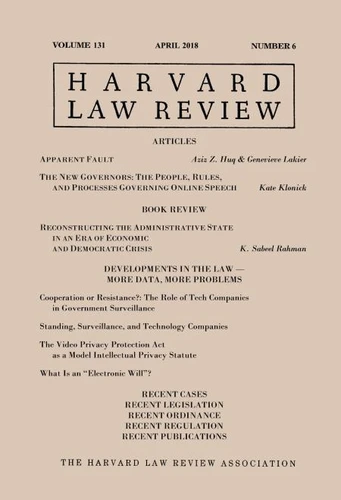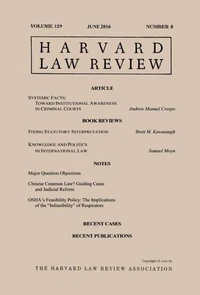Harvard Law Review: Volume 131, Number 6 - April 2018
Par :Formats :
Disponible dans votre compte client Decitre ou Furet du Nord dès validation de votre commande. Le format ePub est :
- Compatible avec une lecture sur My Vivlio (smartphone, tablette, ordinateur)
- Compatible avec une lecture sur liseuses Vivlio
- Pour les liseuses autres que Vivlio, vous devez utiliser le logiciel Adobe Digital Edition. Non compatible avec la lecture sur les liseuses Kindle, Remarkable et Sony
 , qui est-ce ?
, qui est-ce ?Notre partenaire de plateforme de lecture numérique où vous retrouverez l'ensemble de vos ebooks gratuitement
Pour en savoir plus sur nos ebooks, consultez notre aide en ligne ici
- FormatePub
- ISBN978-1-61027-778-5
- EAN9781610277785
- Date de parution07/04/2018
- Protection num.pas de protection
- Infos supplémentairesepub
- ÉditeurMark Childress
Résumé
The April 2018 issue, Number 6, is the annual Developments in the Law special issue. The topic of this extensive contribution is "More Data, More Problems, " including specific focus on the role of technology companies in government surveillance; standing, surveillance, and tech companies; the Video Privacy Protection Act as a model intellectual privacy statute; and the dilemma of the "electronic will." In addition, the issue features these contents:-- Article, "Apparent Fault, " by Aziz Z.
Huq and Genevieve Lakier-- Article, "The New Governors: The People, Rules, and Processes Governing Online Speech, " by Kate Klonick-- Book Review, "Reconstructing the Administrative State in an Era of Economic and Democratic Crisis, " by K. Sabeel RahmanFurthermore, student commentary analyzes Recent Cases or other recent legal actions and decisions on: agency policy and ordering the HHS to allow an undocumented minor to have an abortion; the lack of malicious motive in disloyal labor organizing; severability of claims under Indian Gaming Regulatory Act; reproductive rights and a new Illinois anti-abortion trigger law; use of criminal history in rental decisions in Seattle; and a regulation by the CFPB against payday lending without determining ability to repay.
Finally, the issue includes two brief comments on Recent Publications.
Huq and Genevieve Lakier-- Article, "The New Governors: The People, Rules, and Processes Governing Online Speech, " by Kate Klonick-- Book Review, "Reconstructing the Administrative State in an Era of Economic and Democratic Crisis, " by K. Sabeel RahmanFurthermore, student commentary analyzes Recent Cases or other recent legal actions and decisions on: agency policy and ordering the HHS to allow an undocumented minor to have an abortion; the lack of malicious motive in disloyal labor organizing; severability of claims under Indian Gaming Regulatory Act; reproductive rights and a new Illinois anti-abortion trigger law; use of criminal history in rental decisions in Seattle; and a regulation by the CFPB against payday lending without determining ability to repay.
Finally, the issue includes two brief comments on Recent Publications.
The April 2018 issue, Number 6, is the annual Developments in the Law special issue. The topic of this extensive contribution is "More Data, More Problems, " including specific focus on the role of technology companies in government surveillance; standing, surveillance, and tech companies; the Video Privacy Protection Act as a model intellectual privacy statute; and the dilemma of the "electronic will." In addition, the issue features these contents:-- Article, "Apparent Fault, " by Aziz Z.
Huq and Genevieve Lakier-- Article, "The New Governors: The People, Rules, and Processes Governing Online Speech, " by Kate Klonick-- Book Review, "Reconstructing the Administrative State in an Era of Economic and Democratic Crisis, " by K. Sabeel RahmanFurthermore, student commentary analyzes Recent Cases or other recent legal actions and decisions on: agency policy and ordering the HHS to allow an undocumented minor to have an abortion; the lack of malicious motive in disloyal labor organizing; severability of claims under Indian Gaming Regulatory Act; reproductive rights and a new Illinois anti-abortion trigger law; use of criminal history in rental decisions in Seattle; and a regulation by the CFPB against payday lending without determining ability to repay.
Finally, the issue includes two brief comments on Recent Publications.
Huq and Genevieve Lakier-- Article, "The New Governors: The People, Rules, and Processes Governing Online Speech, " by Kate Klonick-- Book Review, "Reconstructing the Administrative State in an Era of Economic and Democratic Crisis, " by K. Sabeel RahmanFurthermore, student commentary analyzes Recent Cases or other recent legal actions and decisions on: agency policy and ordering the HHS to allow an undocumented minor to have an abortion; the lack of malicious motive in disloyal labor organizing; severability of claims under Indian Gaming Regulatory Act; reproductive rights and a new Illinois anti-abortion trigger law; use of criminal history in rental decisions in Seattle; and a regulation by the CFPB against payday lending without determining ability to repay.
Finally, the issue includes two brief comments on Recent Publications.






















